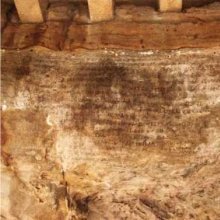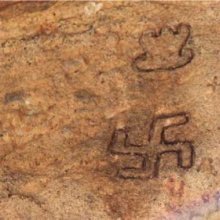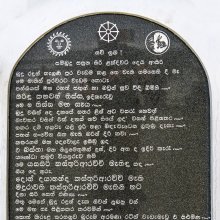Hati: 11 definitions
Introduction:
Hati means something in Hinduism, Sanskrit, Buddhism, Pali, Marathi. If you want to know the exact meaning, history, etymology or English translation of this term then check out the descriptions on this page. Add your comment or reference to a book if you want to contribute to this summary article.
Images (photo gallery)
Languages of India and abroad
Pali-English dictionary
Source: Sutta: The Pali Text Society's Pali-English DictionaryHati, (f.) (fr. han) destruction Dāvs.IV, 17. (Page 728)

Pali is the language of the Tipiṭaka, which is the sacred canon of Theravāda Buddhism and contains much of the Buddha’s speech. Closeley related to Sanskrit, both languages are used interchangeably between religions.
Marathi-English dictionary
Source: DDSA: The Molesworth Marathi and English Dictionaryhaṭī (हटी).—f Commonly haṭṭī.
Source: DDSA: The Aryabhusan school dictionary, Marathi-Englishhaṭī (हटी).—f A petty market. a Obstinate.
Marathi is an Indo-European language having over 70 million native speakers people in (predominantly) Maharashtra India. Marathi, like many other Indo-Aryan languages, evolved from early forms of Prakrit, which itself is a subset of Sanskrit, one of the most ancient languages of the world.
Sanskrit dictionary
Source: DDSA: The practical Sanskrit-English dictionaryHati (हति).—f. [hana-bhāve-ktin]
1) Killing, destruction; वृत्रहत्यै यथा देवाः परिवबुः पुरंदरम् (vṛtrahatyai yathā devāḥ parivabuḥ puraṃdaram) Mahābhārata (Bombay) 7.153.37.
2) Striking, wounding.
3) A blow, stroke.
4) Loss, failure.
5) A defect.
6) Multiplication.
Derivable forms: hatiḥ (हतिः).
Source: Cologne Digital Sanskrit Dictionaries: Shabda-Sagara Sanskrit-English DictionaryHati (हति).—f.
(-tiḥ) 1. Striking, a stroke. 2. Killing. 3. Defect, flaw. 4. Multiplication, (in arithmetic.) E. han, causal v., ktin aff.
Source: Cologne Digital Sanskrit Dictionaries: Benfey Sanskrit-English DictionaryHati (हति).—i. e. han + ti, f. 1. Striking; in kala-, f. Ploughing. 2. Destroying, removing, [Bhartṛhari, (ed. Bohlen.)] 3, 100.
— Cf. A. S. dynt; see han.
Source: Cologne Digital Sanskrit Dictionaries: Cappeller Sanskrit-English DictionaryHati (हति).—[feminine] striking, stroke, blow.
Source: Cologne Digital Sanskrit Dictionaries: Monier-Williams Sanskrit-English Dictionary1) Hati (हति):—[from han] f. striking, a stroke or blow with ([compound]), [Gīta-govinda; Sarasvatī-kaṇṭhābharaṇa, by Bhoja]
2) [v.s. ...] killing, destroying, destruction, removal, [Mahābhārata; Kāvya literature] etc.
3) [v.s. ...] disappearance, loss, absence, [Kapila]
4) [v.s. ...] (in [arithmetic]) multiplication, [Āryabhaṭa [Scholiast or Commentator]]
Source: DDSA: Paia-sadda-mahannavo; a comprehensive Prakrit Hindi dictionary (S)Hati (हति) in the Sanskrit language is related to the Prakrit word: Hai.
[Sanskrit to German]
Sanskrit, also spelled संस्कृतम् (saṃskṛtam), is an ancient language of India commonly seen as the grandmother of the Indo-European language family (even English!). Closely allied with Prakrit and Pali, Sanskrit is more exhaustive in both grammar and terms and has the most extensive collection of literature in the world, greatly surpassing its sister-languages Greek and Latin.
Kannada-English dictionary
Source: Alar: Kannada-English corpusHati (ಹತಿ):—
1) [noun] the act of striking, hitting.
2) [noun] a destroying or being destroyed.
3) [noun] a stroke or blow.
Kannada is a Dravidian language (as opposed to the Indo-European language family) mainly spoken in the southwestern region of India.
See also (Relevant definitions)
Starts with (+18): Hate, Hati bandhalata, Hati khutura, Hati njerang, Hati-bandha-lata, Hati-hati, Hati-jara, Hati-kana, Hati-sand, Hatibhekuri, Hatichinch, Hatigey, Hatihuria, Hatika, Hatikan, Hatikanapatra, Hatikanopotro, Hatilomatilo, Hatini, Hatinu.
Ends with (+1946): Aarbhati, Abandhati, Abbahati, Abbhacikkhati, Abbhakkhati, Abbhuggacchati, Abbhutthati, Abbuhati, Abbulihati, Abhashati, Abhati, Abhibhashati, Abhidashati, Abhighati, Abhigijjhati, Abhihati, Abhijighacchati, Abhijjhati, Abhikankhati, Abhilanghati.
Full-text (+12): Halahati, Pratihati, Vihati, Bhrunahati, Ahati, Paddhati, Hati-hati, Hati njerang, Hati khutura, Kalah, Hati bandhalata, Parahati, Vatahati, Apahati, Hai, Bhrunahanana, Hati-kana, Karahati, Shvasari, Prahati.
Relevant text
Search found 9 books and stories containing Hati, Haṭī; (plurals include: Hatis, Haṭīs). You can also click to the full overview containing English textual excerpts. Below are direct links for the most relevant articles:
Jainism in Odisha (Orissa) (by Ashis Ranjan Sahoo)
Jainism in the Inscriptions of Odisha (Introduction) < [Chapter 7]
Jaina Antiquities at Udayagiri Hills (Khordha) < [Chapter 3: Survey of Jaina Antiquities in Odisha]
Review of Literature < [Chapter 1]
Atithi or Guest Reception (study) (by Sarika. P.)
Part 9 - Paddhatis (ceremonial guides) < [Chapter 5 - The Dharmaśāstra Literature]
A Collection of Popular Tales from the Norse and North German (by Peter Christian Asbjørsen)
Lord Jhulelal: An Analytical Study (by Thakkar Harish Gopalji)
Part 23 - Sufism and Sindh < [Chapter 4 - Analysis]
Daśāvatāra-stotram (by Jayadeva Gosvami)
Vernacular architecture of Assam (by Nabajit Deka)
Techniques (e): Roof Construction Technique < [Chapter 4]


